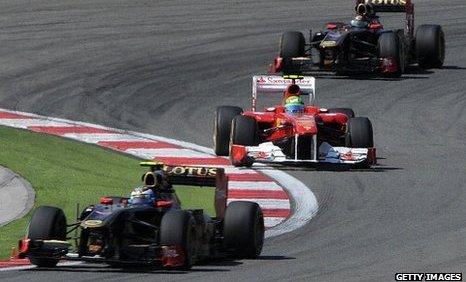FIA ban new technical innovation developed by Lotus and Ferrari
- Published

Lotus and Ferrari are said to be unconcerned with the decision to ban the system
A ride-height control system being developed by Lotus and Ferrari has been banned by Formula 1's governing body, the FIA.
The two teams were initially told the device, which aims to keep the car stable during braking, was legal.
But following further investigations, and representations from rival teams, the FIA has changed its view.
The device has now been outlawed on the basis that its primary function is to improve the car's aerodynamics.
The new system has been designed to keep the car's ride-height as constant as possible during braking because any changes have a significant effect on the airflow over and under the car and consequently its performance.
The ride-height of an F1 car moves only a few millimetres, but the more it can be kept at its ideal level, the better the car's performance.
The device is operated via a hydraulic cylinder on the front suspension that reacts to braking forces.
It controls the length of the push-rod - the suspension arm that stretches from the springs and dampers on the top of the car's chassis to the bottom of the wheel upright - in response to braking forces. The brake caliper also moves.
In doing so, the system limits the amount the front of the car dips during braking.
The FIA has banned similar devices that control the movement of a car's chassis over the years. But the governing body initially felt the device in question was a part of the suspension and did not contravene that area of the rules.
But insiders say that, once it became clear its main role was to improve aerodynamics, banning it was a "no-brainer".
Article 3.15 of the F1 technical regulations requires that any aerodynamic effect created by the suspension should be incidental to its primary function.
It further states that any device that influences the car's aerodynamics "must remain immobile in relation to the spring part of the car".
An FIA insider said Lotus and Ferrari seemed unconcerned at the decision to ban the device.
- Published11 June 2011
- Published16 May 2011